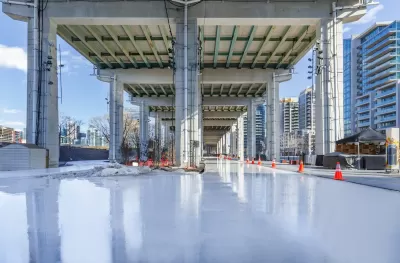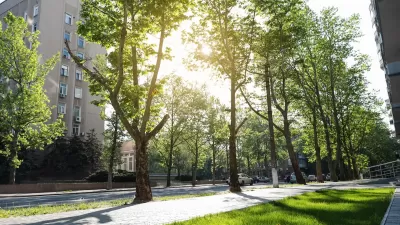The park is part of a global movement to build public spaces that connect neighbors and work with local elements to serve as key parts of a city’s green infrastructure.

A new park in Montreal sits atop a disused railway track and features ‘mini-forests’ planted to encourage the quick growth of native plants, reports Kelsey Rolfe in The Globe and Mail.
“The park’s design hearkens back to its previous life: after the tracks were abandoned in the 1990s, trees and vegetation grew wild on the site. It became an unofficial but beloved local park and community space for the part-industrial neighbourhood until a developer cut down the trees without permission in 2013.” Now, thanks to a decade of community advocacy, the city spent $10 million to acquire and redevelop the site.
Gorilla Park, as it’s known, hosts over 1,500 trees and shrubs and seeks to mimic the spontaneous forest that grew on the site previously. According to Rolfe, “It’s just one example of the transformation under way across Canada to make public spaces more sustainable and community focused.” In Toronto, a 1.75-kilometer linear park dubbed The Bentway nestled under the Gardiner Expressway doubles as a recreational space and stormwater infrastructure. “ It now draws hundreds of thousands of Torontonians every year for skating in the winter, free public events and art installations in the other seasons and cycling and walking on its trail network year-round.”
FULL STORY: Turning railway lands into parkland: How cities are reinventing public space

Planetizen Federal Action Tracker
A weekly monitor of how Trump’s orders and actions are impacting planners and planning in America.

Maui's Vacation Rental Debate Turns Ugly
Verbal attacks, misinformation campaigns and fistfights plague a high-stakes debate to convert thousands of vacation rentals into long-term housing.

Restaurant Patios Were a Pandemic Win — Why Were They so Hard to Keep?
Social distancing requirements and changes in travel patterns prompted cities to pilot new uses for street and sidewalk space. Then it got complicated.

In California Battle of Housing vs. Environment, Housing Just Won
A new state law significantly limits the power of CEQA, an environmental review law that served as a powerful tool for blocking new development.

Boulder Eliminates Parking Minimums Citywide
Officials estimate the cost of building a single underground parking space at up to $100,000.

Orange County, Florida Adopts Largest US “Sprawl Repair” Code
The ‘Orange Code’ seeks to rectify decades of sprawl-inducing, car-oriented development.
Urban Design for Planners 1: Software Tools
This six-course series explores essential urban design concepts using open source software and equips planners with the tools they need to participate fully in the urban design process.
Planning for Universal Design
Learn the tools for implementing Universal Design in planning regulations.
Heyer Gruel & Associates PA
JM Goldson LLC
Custer County Colorado
City of Camden Redevelopment Agency
City of Astoria
Transportation Research & Education Center (TREC) at Portland State University
Jefferson Parish Government
Camden Redevelopment Agency
City of Claremont





























